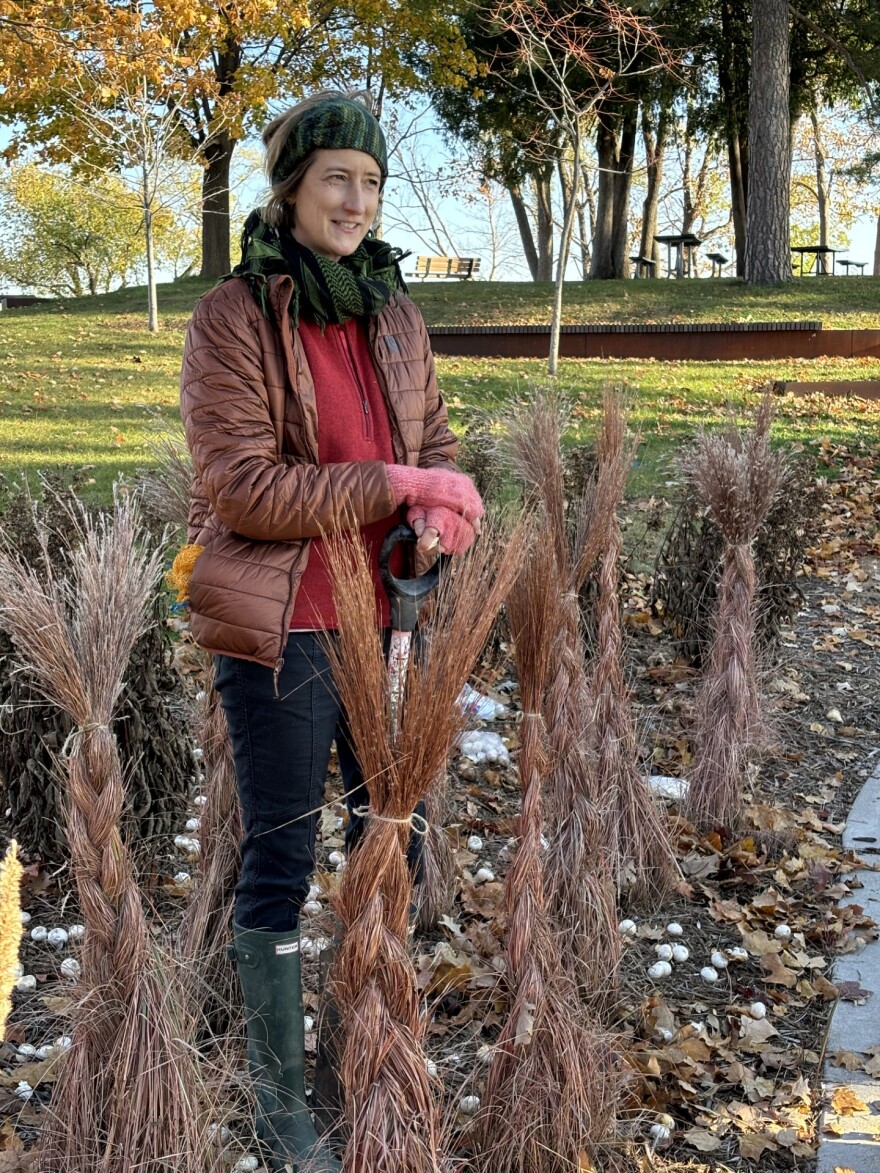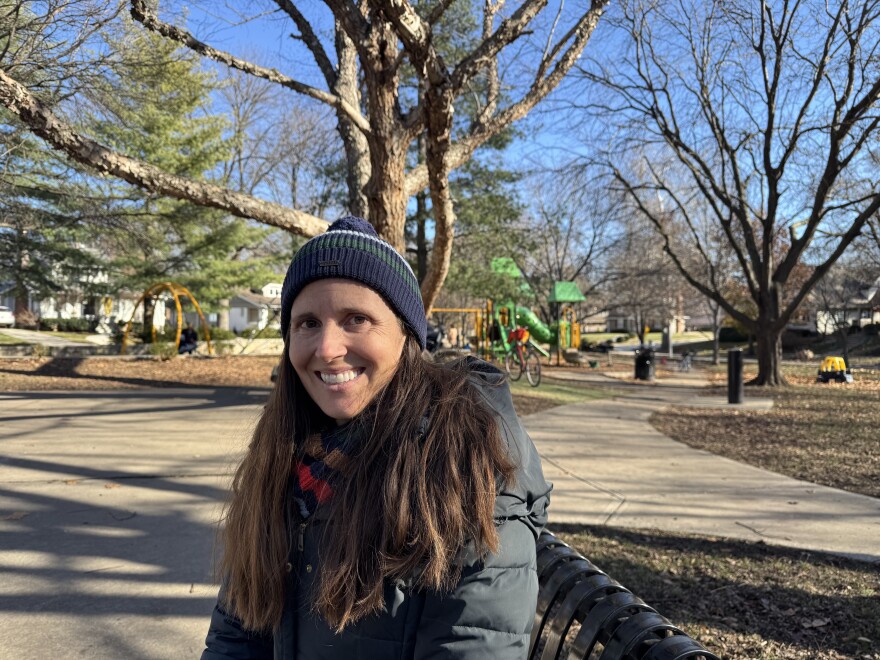Jen Schroeder’s two sons love their neighborhood park in Kansas City. It’s got a playground, space to play soccer and it's only five minutes away from their home.
“It's so close to us and we love to ride our bikes over here,” she said.
Like many parents, Schroeder wants her kids to spend time outside. But she also worries about the impacts of chemicals like pesticides and fertilizers on her sons’ health.
So when she saw a flier for a national program that helps cities cut back on the use of nonorganic lawn care, Schroeder brought it up to the Kansas City Parks and Recreation Department. She started working with the staff to apply.
Now, the park is one of two outdoor spaces in Kansas City that will halt the use of fertilizer, weed killers and insecticides typically used in public parks.
The projects are part of the Parks for a Sustainable Future program run by Beyond Pesticides, a Washington D.C.-based nonprofit that focuses on health and environmental policy. The group is working with local communities and parks departments across the country to phase out the use of chemical lawn care in public green spaces and provide staff with organic agriculture training.
The nonprofit is already working with multiple cities in the U.S., and new communities in the Midwest plan to start projects soon.
Rika Gopinath, a community policy and action manager with Beyond Pesticides, said the program is meant to enhance microbial life and nutrients in the local soil. Cities consult with technical experts provided through the program and receive a two-year implementation plan. Depending on the site needs, that might include organic soil amendments and aeration to help strengthen grass roots.
She said those combined methods can help reduce water usage, encourage healthy plant growth and maintain aesthetic grass turfs.
“Grass seed becomes your best herbicide and you can outcompete the weeds,” Gopinath said. “And you're building healthy soil to grow the grass rather than giving it an injection of something synthetic to green it up.”
Organic grocery store chain Natural Grocers is underwriting the costs for the program’s horticulture consultation services, soil testing and the development of the new land management plans, according to Gopinath.
In Kansas City, the organic land management project will be piloted at Arbor Villa Park, a one-acre park with a playground, tennis courts and grass turf. The second location will be at the 27-acre Pleasant Valley Road Athletic Complex, which features four baseball diamonds and a softball field. Implementation is expected to start this upcoming spring, when ground temperatures warm up and soil tests can be run.
Officials in Kansas City said the switch from traditional applications at the two sites will make those urban spaces more sustainable and safer for both community members and local wildlife.
“Working with Beyond Pesticides is an important step in implementing our Parks and Recreation Sustainability Plan. Part of that plan calls for implementing an Integrated Pest Management System,” said Stephen Van Rhein, the environmental manager for Kansas City Parks and Recreation, in a news release. “Beyond Pesticides program will help train our staff to understand how we can have great athletic fields while building healthy soil and using only organic methods.”

Gopinath thinks it's exciting to get started in a place like Kansas City, where the parks and recreation department has been working on its own sustainability plan since 2018. But she said it’s also an opportunity to work toward protecting the overall health of community members – something she feels is not always a priority when it comes to maintaining green spaces.
“A daisy or two on the grass turf or some clover is actually okay and is a sign of not using synthetic pesticides – which can be really harmful, especially to vulnerable populations,” she said. “Young children, older people, people who are immunocompromised, pregnant people. There's a lot of reasons to try and take exposure to pesticides away and help people realize that a perfectly manicured, 1950s looking lawn is not necessarily the best way to use our natural public resources.”
Other Midwest cities plan projects
Advocates and elected officials in Excelsior, Minnesota – which is a few miles outside of Minneapolis – are also planning to launch the program in the spring. The projects will focus on three different sites in the city, including a historic baseball park, a shoreline turf area used for yoga and other community classes, and a more than 100,000 square-foot lawn that hosts multiple concerts each summer.
City councilmember Jennifer Caron has been working with horticulturist Colleen Lockovitch and the public works department to help the city step away from petrochemical-based land management practices in favor of organic care. She is eager to see it happen locally, since all three sites are currently using synthetic herbicides and fertilizers.
“We're just very excited about these test sites and the ability to learn and collaborate with [Beyond Pesticides] and hopefully expand into larger areas of our parks and other parks,” Caron said.
Like Schroeder in Kansas City, Lockovitch played a crucial role in bringing the program to Excelsior. She primarily works to help city schools and municipalities create more sustainable gardens, but said the program is about more than just local parks. She said it's also important to support habitat for multiple species across the region, including bees, other pollinators and native fish.

“The Midwest is a special place,” said Lockovitch. “We used to be a prairie. We have a lot of agriculture. We also have a lot of fresh water. And to me, these are all directly linked … community health, the environment, creating healthy ecosystems, pollinator corridors, native plantings. Everything is related.”
In Iowa, community advocates like Audrey Tran Lam are also working to change how outdoor spaces rely on pesticides. As the environmental health program director at the University of Northern Iowa, she’s been working toward prioritizing public health through an initiative called Good Neighbor Iowa.
“We have a relationship with Beyond Pesticides and we're sort of helping spread the word about Parks for a Sustainable Future through our work – elevating the public health evidence about why pesticides are harmful,” said Tran Lam.
Infants and children can be more sensitive to the toxic effects of pesticides, according to the National Pesticide Information Center, which is run through a cooperative agreement between Oregon State University and the U.S. Environmental Protection Agency.
For Tran Lam, the benefits of a green lawn do not outweigh potential risks.
“Mostly we use herbicides in public parks and backyards for totally cosmetic purposes, right?” she said. “Nonessential use. We can just totally get rid of it.”
The program is already running at Grinnell College in Iowa, but Tran Lam said that she and her community partners are hoping to soon launch more partnerships with the city of Dubuque, as well as the University of Iowa.
Tran Lam said she feels encouraged that the program is accessible and happening in places like Kansas City and Excelsior.
“This is applicable to not only these big cities, but these tiny towns,” she said. “Like no matter what the resources you have at your fingertips, you're able to implement solutions in your parks, your playscapes, your schools, that is protective of human and public health.”
This story was produced in partnership with Harvest Public Media, a collaboration of public media newsrooms in the Midwest. It reports on food systems, agriculture and rural issues.


